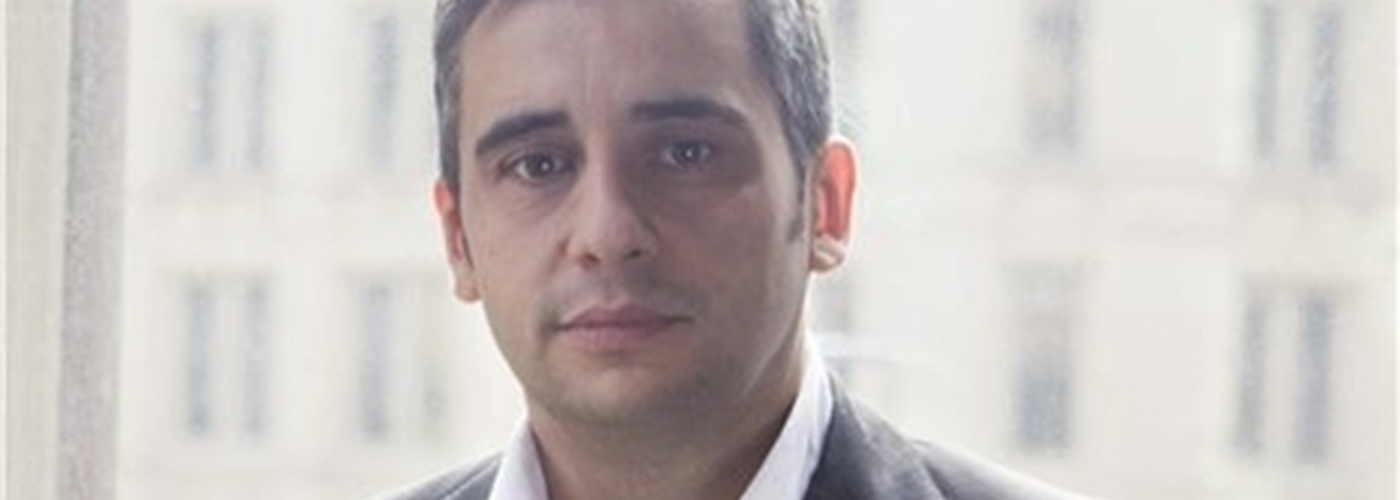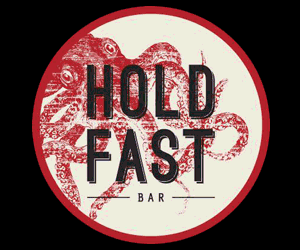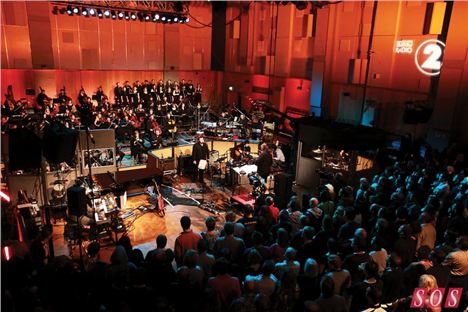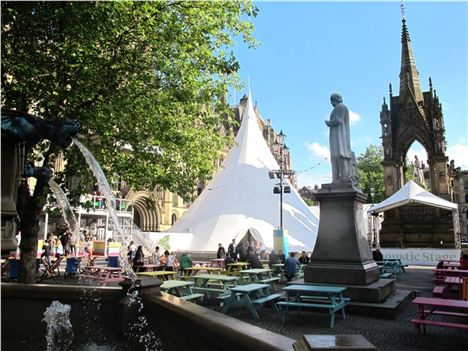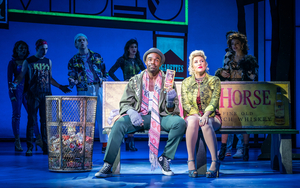Following the 2015 launch, David Blake speaks to the soon to be departing father of the festival
TURNER Prize-winning artist and Glasgow-born barnpot Douglas Gordon has just hopped on stage and planted his seventeenth kiss on the lips of MIF Director, Alex Poots, in front of hundreds of well-heeled, round-spectacled chin-strokers and others of a less chin-strokey nature.
"The Age of Starlight is by far the riskiest thing we've ever done - we're in the hands of a technology that hasn't even been invented yet."
There's quiet, confusion, awkwardness. Will he stop kissing Poots? He keeps going. He stops. Relief. Poots barely flinches throughout. Why? Because Poots - the father of Manchester International Festival for a decade and a model of serene professionalism - has a festival programme to present, and no amount of heavy on-stage petting via a bullish Scot is going to thwart that.
And anyway, Gordon is an artist... artist's are weird (as a colleague later remarked, "normal people don't make great art").
Before Manchester's so-called 'cultural renaissance', before the £78m Factory, or the £50m revamped Central Library, or the £25m HOME arts centre, or the £15m refurbed Whitworth; before the BBC's move to Salford, or the Hallé St Peters, or the new £34m School of Art, there was MIF and there was Poots.
And though the council, steered by the unflagging Sir Richard Leese and Sir Howard Bernstein, are to thank for much of the city's soaring cultural stock (let's not forget the Universities and the Lottery), it's impossible to overlook the impact Poots and his team have had on Manchester's cultural coming-of-age.
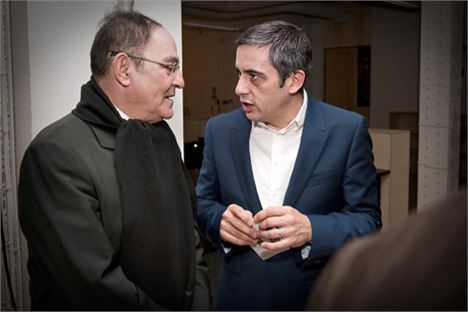 Alex Poots with Manchester City Council chief exec Sir Howard Bernstein
Alex Poots with Manchester City Council chief exec Sir Howard Bernstein
In 2005 Leese plucked Poots - whose previous work included stints at the Tate, the Barbican, the South Bank Centre and the BBC - from a cushty position at the English National Opera and gave him money, a city and a festival.
What Poots created - with help from business-minded former Time Out director Christine Cort - was the world's first ever biennial festival of entirely new and original work.
Launched in 2007, Poots has coaxed, amongst others, Hollywood actor William Dafoe, Icelandic icon Bjork, and Oscar-winning director Steve McQueen, serial oddity Marina Abramovic to the city, and has just announced the full 2015 programme featuring FKA Twigs, Maxine Peake and Oscar-winning director Kevin MacDonald - read here.
In between his home life in London, his other part-time job at New York's Park Armory, and his bread and butter in Manchester, Confidential caught up with Poots, who'll soon leave MIF behind for a new role at New York's $360m Culture Shed...
Q: So this is your last MIF before leaving for New York, what's been MIF's overriding achievement?
Poots (P): "One of the things I'm most proud of is to have done what Manchester has been doing for a very long time, working together to make this city better. It's not something I've felt this strongly in a city anywhere else in the world, this sense of cohesion, the canny way everyone in Manchester gets behind something, whether it is the citizens, or businesses or the council. We've just seen it with HOME and The Whitworth, there's a powerful belief here."
Q: If you had the chance, which past MIF performance would you want to revisit?
P: "That's like picking one of your children as your favourite. Steve McQueen's work in 2007 (Queen and Country) was both a beautiful and very important piece of work. In terms of pure civic pride, it'd have to be Elbow and the Hallé Orchestra. I have to be nostalgic about Monkey: Journey To The West as well, it opened the first festival and went on to tour the world - it played New York only last week."
Q: Since MIF's inception, has Manchester become more culturally significant across the world?
P: "I can only quote what people have said to me, for example, the current director of the Chatelet Opera House in Paris recently said that historically he'd always viewed Manchester in terms of industry, and more recently through football. It wasn't until MIF that he thought of Manchester in terms of culture. For a lot of people around the world it fills in the gaps, perhaps if we'd been out on our own we wouldn't have carried so much significance, but put it alongside the BBC move, and the Hallé, and The Whitworth, add in the legacy of Factory Records and you start to get a globally significant cultural city."
Q: What are you most looking forward to in 2015?
P: "These shows are all my babies, but we've been trying for more than five years to develop a full length ballet; so I'm really looking forward to Tree of Codes with Wayne McGregor, the Paris Opera Ballet, Jamie xx and Olafur Eliasson - his show at the Tate a few years ago drew one million visitors. It's something we've been trying to do for so long and it's finally coming together for us.
Q: MIF prides itself on pushing the boundaries of performance, how will you be pushing it this year?
P: The Age of Starlight is by far the riskiest thing we've ever done - we still don't even know if and when we get to present it. It's just such an amazing idea, such an important idea, we have to do it; whether we show it this year or have to wait until 2016 we don't know. We're in the hands of a technology that hasn't even been invented yet - we're developing a way to introduce a virtual reality, an imagined world, directly into your real world field of vision.
Q: Last year was about 'found' spaces, but this year sees the use of more established venues. Why is that?
P: "It always starts with the artist and finding them the perfect space for what they want to do. We'd never force a space down them just because we think its a cool space. For a musical you want an old, traditional theatre, but for FKA Twigs, for example, making these films in the former Granada Studios just fits. It's not so much about discovering new spaces, its about finding the best spaces for the artist and reworking them. The great thing about Manchester city centre is that it's not all just offices, there's still places like Granada Studios, or the Mayfield Depot, or the Hallé St Peter's to remodel and reimagine."
Q: In the past, the festival has been described as elitist. But isn't that the point, to broaden Manchester's experience of world class culture?
P: "It depends entirely who you speak to. I have arts colleagues around the world that ask me why I have so much pop music in the festival and don't put on more high-arts. It's down to perspective. As an arts festival I don't think we could be more embracing of popular culture; our ballet and musical are composed by popstars (Jamie xx, Damon Albarn) - it doesn't get much less elitist than that.
"Ok, we could put Take That on at the arena, but that's not adding anything new, we're just wading in on someone else's patch. What we'd much rather do is develop a year long relationship between Elbow and the Hallé orchestra and put on two unique nights at the Bridgewater Hall that many still consider to be the best show they've ever seen.
"And everyone should have access to these precious things in life, which is why ten percent of all tickets are available for £12 to those on or below a living wage - we're trying to make it accessible without dumbing it down."
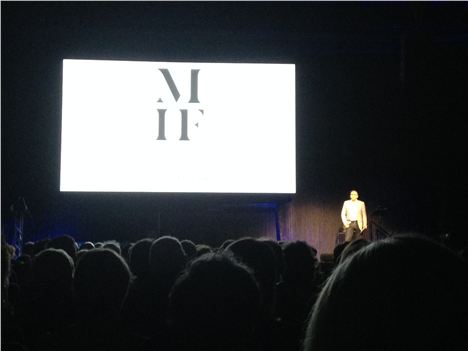 Poots presents the 2015 programme at Old Granada Studios
Poots presents the 2015 programme at Old Granada Studios
Q: Has the political leadership in Manchester made your job easier? Sir Richard Leese and Sir Howard Bernstein are powerful personalities, has their drive cleared the path for you to make decisions freely and without compromise?
P: "Before I accepted the job ten years ago, I asked for some guarantees in writing; to delay the festival by another year; to put in a sizeable amount of money; to make the festival independent of influence from funders, and to make it a charitable company limited by guarantee. And they've stuck true to their word.
"This was actually tested very early on. I've never shared this before, but in 2007 Steve McQueen was to present a piece commemorating soliders that had died in Iraq. This would air three weeks before Blair and Labour gave their first ever party conference in Manchester. As you can imagine, the subject of Iraq was not a popular topic with the Labour Party. Still, as we always have we presented the festival programme to the city's Labour Party leadership. I told them the work may prove uncomfortable, but that this was a hugely significant piece of art by a very important artist, and that we had to do it. They put up no opposition whatsoever. That's testament to the council, when it's come to sponsors and investment they've been very hands on, when it comes to the arts they've been utterly hands off."
Q: Finally, will you still be involved with MIF after your move to New York?
P: "What I would love, and this is up to the incoming director, is to create even more links between Manchester and New York. We've already started with the co-commissions and my stint at the Park Armory, but I feel the relationship between these two great pioneering cities could develop even further. In that manner I'd still feel connected to Manchester."





